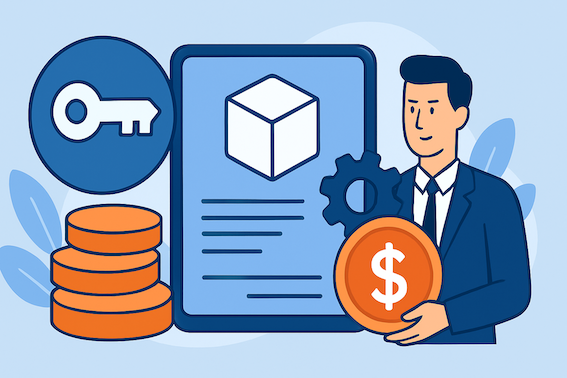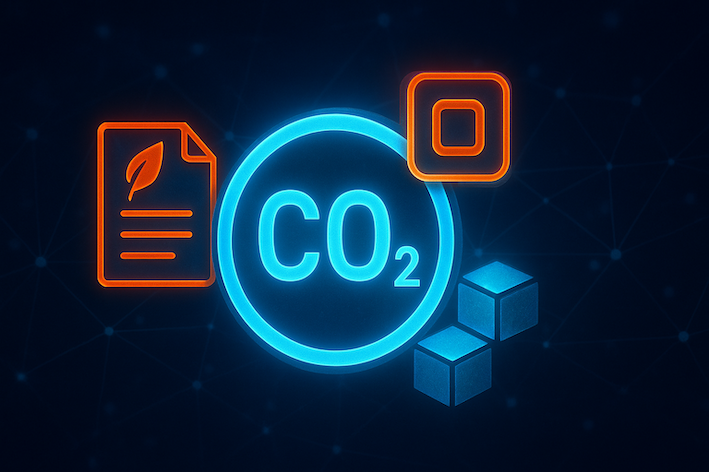How to Choose the Right Platform for Tokenizing Real-World Assets
With the maturation of blockchain technology, real-world asset (RWA) tokenization is evolving rapidly from a proof-of-concept to a compelling vehicle for accessing liquidity, improving access, and increasing transparency in historically illiquid markets. Whether it is real estate or art, private equity or debt, tokenization brings the prospect of fractional ownership, borderless investing, and easy compliance. But with the rising tide comes an increased number of tokenization platforms, which renders making the right choice both imperative and daunting.
This article is your guide for evaluating tokenization platforms and for identifying the key components to look out for when choosing a platform that can make your tokenization efforts truly actionable.
What Is RWA Tokenization—and Why Is It Gaining Ground?
Real-World Asset (RWA) tokenization is the process of issuing a digital equivalent of a real or traditional financial asset—e.g., property, art, private equity, or commodities—on a blockchain. Digital tokens issued through tokenization are derived from actual legal or financial entitlements, rather than merely being symbolic representations; they are imbued with real legal or financial entitlements, such as ownership, dividend entitlements, or revenue shares. Smart contracts applied in the process enable the tokens to represent advanced conditions, enforce compliance, and enable transfers without a hitch.
The traction behind RWA tokenization is growing rapidly, and rightly so. Legacy markets are siloed, illiquid, and encumbered with layers of middlemen. Tokenization brings a revolutionary substitute.
The Benefits Are Compelling:
- Liquidity Unlock: Tokenization allows for fractional trading of historically illiquid assets like real estate or fine art. Owners don't need to offload entire properties or wait for months or even years for a buyer—smaller ownership stakes can be traded easily.
- Fractional Ownership: By dividing an asset into digital shares, tokenization lowers investment minimums. This democratizes access and makes it possible for smaller investors to invest in high-value asset classes that were formerly reserved for institutions.
- Global Investor Access: Blockchain infrastructure is borderless by design. Investors from anywhere in the world can invest in tokenized offerings without being restricted by traditional banking or brokerage systems.
- Operational Efficiency: Smart contracts tokenize key processes—such as dividend payments, voting rights, and compliance checks—reducing paperwork, manual monitoring, and the risk of human error.
- Transparency & Trust: Blockchain's immutable ledger renders all transactions traceable, time-stamped, and tamper-proof, strengthening investor trust and simplifying audits.
For all its promising potential, the true value of tokenization hinges on implementation—and implementation begins with choosing the right platform. The wrong choice can lead to regulatory headaches, limited interoperability, and technological hurdles. That is why serious evaluation of platforms is not only recommended—it is essential.
Key Considerations When Choosing a Tokenization Platform
Selecting a tokenization platform is not a one-size-fits-all decision. It'sabout having a deep understanding of your asset class, investor base, jurisdictional requirements, and long-term goals. Here are some points to keep in mind:
1. Regulatory Compliance
Compliance is not an option in today's highly regulated financial landscape—it's a foundation. The platform you select must be built with regulatory compliance as its core.
Look for:
- Integrated KYC/AML functionality that verifies investor identities and prevents illicit transactions.
- Conformity with global and regional regulatory schemes—by the SEC in the US, ESMA in the EU, and ADGM in the UAE.
- Dynamic smart contracts that are capable of enforcing jurisdictional limits, transfer rules, and investor qualification.
A platform that takes compliance seriously will help you navigate legal complexities and avoid costly regulatory pitfalls.
2. Asset Agnosticism
Tokenization is not limited to one asset class. Your platform needs to allow you to tokenize a broad range of asset classes:
- Real estate
- Private equity and venture capital interests
- Fixed-income securities and bonds
- Fine art and high-end collectibles
- Intellectual property and royalties
An asset-agnostic platform lets you diversify your product or change your business model without being burdened with the need for a new infrastructure.
3. Technology Stack & Blockchain Flexibility
Behind every tokenized asset lies a blockchain network—but not all blockchains or tech stacks are created equal.
Consider:
- Blockchain Agnosticism: Can the platform support multiple Layer-1 and Layer-2 chains (e.g., Ethereum, Polygon, Avalanche)?
- Smart Contract Standards: Are they customizable, auditable, and interoperable?
- On-chain vs. Off-chain Data Handling: Does the platform offer efficient data integration that balances transparency and confidentiality?
The ability to choose the right blockchain for your use case—whether it’s for cost efficiency, speed, or ecosystem access—is critical for long-term scalability.
4. Customization & Control
No two issuers are the same. Your platform needs to give you the power to customize the tokenization process according to your specific operational, legal, and investor needs.
This includes:
- Configurable token rights (voting, dividends, lock-in terms)
- Role-based issuer, investor, and administrator access
- Dynamic smart contract modules without the presence of developers for every adjustment
Customizable platforms by their fundamental nature allow you to make products, not just issue tokens.
5. Interoperability
Tokenized assets must interface with the broader financial and Web3 ecosystem.
Your platform will need to play nicely with:
- Custody providers for secure storage
- Exchanges and marketplaces to access liquidity
- Cap table and investor management tools
- Holistic support through regulatory and legal partners
Interoperability ensures your tokens are not just minted, but they are also usable, transferable, and legally sound.
6. Security & Data Integrity
Security is at the top of the list when it comes to high-value assets and personal data.
Best-in-class platforms will provide:
- End-to-end encryption of user and transaction data
- Independent smart contract audits
- Multi-signature wallets and key management services
- Real-time monitoring and threat detection
Security isn't a feature—it's a trust layer that supports your investors, your reputation, and your bottom line.
7. Track Record & Transparency
Among an ocean of whitepapers and prototypes, delivery is paramount. Ask potential providers:
- Can you present live deployments on multiple asset classes?
- Are contracts and audits open for the public to view?
- What measurable results have your customers attained (liquidity events, investor growth, etc.)?
A respectable platform ought to have open, real-world results.
8. User Experience & Support
A great platform is worthless if one has trouble using it or in being supported.
Look out for:
- Intuitive dashboards simplifying complex actions
- Easy to understand onboarding flows and documents
- Fast-responsive customer success team
- Ongoing support of legal structuring, token life cycle management, and investor outreach
Especially for enterprises new to blockchain, robust UX and guidance can be the difference between success and stall.
Common Pitfalls to Avoid
Choosing the wrong platform can delay your tokenization process by months—or worse, put your business at risk. Be wary of:
- Overgeneralized, one-size-fits-all platforms: These usually fail to provide the necessary flexibility to address your unique regulatory, technical, or asset needs. What suits one asset class or territory can prove catastrophic for another.
- Platforms with no live deployments: If a platform can't reference real-world usage, then it may not be ready for production. Tokenization isn't theoretical—it must work in the state of a real market.
- No post-tokenization support: Some platforms focus on issuance and disappear on deployment. Your journey doesn't end at minting. Secondary trading, investor support, audit, and reporting support will be needed.
- Poor governance controls: Without good admin and compliance controls in the platform, you may leave yourself open to internal errors or external threats.
Doing your due diligence up front can save a lot of hassle, cash, and legal risk down the line. It's worth vetting before you commit.
Why Zoniqx Stands Out
Zoniqx is not just another tokenization provider—we are a comprehensive infrastructure partner built to help you launch, manage, and scale real-world asset tokenization with confidence.
Here’s what makes us different:
- Compliance-first design: From jurisdictional whitelisting to automated KYC/AML, Zoniqx embeds compliance across every layer of its platform.
- Asset-agnostic, multi-chain support: Tokenize real estate, debt, funds, or commodities on the blockchain best suited for your needs.
- Custom smart contracts: Modular, auditable, and tailored to your investor structure.
- Seamless integrations: We partner with custody providers, exchanges, legal firms, and analytics tools to offer a 360° tokenization experience.
- Live deployments and success stories: Zoniqx powers real projects with measurable results. Our clients aren’t just experimenting—they’re transacting.
- End-to-end support: From token design and compliance structuring to investor onboarding and liquidity enablement, we walk the entire journey with you.
- Dedicated success team: We don’t just provide software. We provide strategic insight, regulatory clarity, and operational know-how to help you win.
Whether you're a fund manager, real estate developer, or fintech startup, we offer not just tools—but a trusted roadmap.
Conclusion
The promise of tokenization is massive—but realizing that promise requires more than hype. It demands a platform that’s secure, scalable, compliant, and purpose-built for real-world complexity.
At Zoniqx, we bring together deep regulatory insight, cutting-edge technology, and real-world deployment experience to help you navigate this transformation. If you're serious about making your assets liquid, accessible, and future-ready, it’s time to work with a partner who’s already doing it.
About Zoniqx
Institutional-Grade, Secure, and Future-Ready AI-Powered Multi-Chain Technology for Real-World Asset Tokenization
Zoniqx ("Zoh-nicks") is a global fintech leader headquartered in Silicon Valley, specializing in converting real-world assets into Security Tokens. Zoniqx leverages cutting-edge AI-driven multi-chain technology to enable seamless, secure, and regulatory-compliant RWA tokenization. Their platform integrates advanced compliance frameworks, supporting multiple regulatory structures and diverse asset classes.
With AI-powered automation, Zoniqx facilitates global liquidity and seamless DeFi² integration, enhancing accessibility and efficiency. Their interoperable architecture ensures smooth integration across multiple blockchains, while their robust suite of SDKs and APIs empowers developers with powerful tools for innovation. Zoniqx pioneers on-chain, fully automated RWA deployment on public, private, and hybrid chains.
To explore how Zoniqx can assist your organization in unlocking the potential of tokenized assets or to discuss potential partnerships and collaborations, please visit our contact page.



